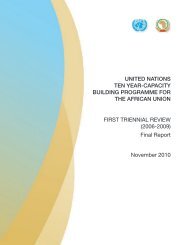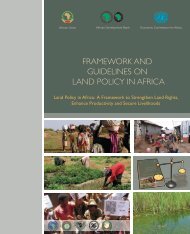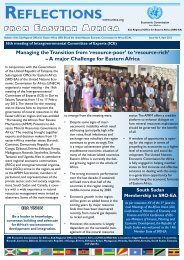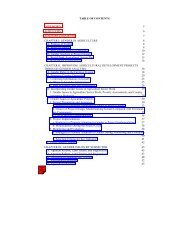A Decade of NEPAD - Economic Commission for Africa - uneca
A Decade of NEPAD - Economic Commission for Africa - uneca
A Decade of NEPAD - Economic Commission for Africa - uneca
You also want an ePaper? Increase the reach of your titles
YUMPU automatically turns print PDFs into web optimized ePapers that Google loves.
62 A <strong>Decade</strong> <strong>of</strong> <strong>NEPAD</strong>: Deepening <strong>Africa</strong>n Private Sector and Civil Society Ownership and Partnership<br />
The Council <strong>of</strong> Ministers also encouraged the Secretary-<br />
General to intensify ef<strong>for</strong>ts aimed at furthering civil society<br />
involvement in the work <strong>of</strong> the OAU. This process was accelerated<br />
by the introduction <strong>of</strong> the CSSDCA programme<br />
into the work programme <strong>of</strong> the OAU in December 2001<br />
when the CSSDCA was given the responsibility <strong>of</strong> bringing<br />
civil society into the mainstream affairs <strong>of</strong> the organization.<br />
In June 2002, pursuant to recommendations made<br />
at the 1 st OAU-CSO Conference, a civil society <strong>of</strong>ficer was<br />
appointed to serve within the CSSDCA Unit.<br />
From June 11-14, 2002 in Addis Ababa, Ethiopia, a second<br />
OAU- CSO conference was held under the theme “Developing<br />
Partnership between the OAU and <strong>Africa</strong>n Civil<br />
Society Organizations”. Out <strong>of</strong> the conference came the<br />
OAU-Civil Society Provisional Working Group which<br />
established a regionally representative cadre <strong>of</strong> CSOs as a<br />
body to work closely with the planned <strong>Africa</strong>n Union <strong>Commission</strong><br />
<strong>for</strong> a period <strong>of</strong> two years – in between the meetings<br />
<strong>of</strong> the larger Assembly. An additional conference outcome<br />
was an agreement to trans<strong>for</strong>m the working Group into a<br />
<strong>for</strong>mal steering Committee at its next meeting.<br />
The role <strong>of</strong> CSOs in the work <strong>of</strong> the <strong>Africa</strong>n governing<br />
body was further entrenched by the provisions <strong>of</strong> the<br />
Constitutive Act <strong>of</strong> the <strong>Africa</strong>n Union, which was established<br />
in July 2002 as the AU’s successor and called <strong>for</strong> the<br />
establishment <strong>of</strong> an <strong>Economic</strong>, Social and Cultural Council<br />
(ECOSOCC) to serve as an advisory organ. ECOSOCC was<br />
to be composed <strong>of</strong> different social and civic organizations<br />
from within the Member States <strong>of</strong> the Union. The Provisional<br />
Working Group was in fact ECOSOCC’s precursor.<br />
Following the 2002 meeting, two further meetings were<br />
held, the first in Accra, Ghana in October 2002, and the<br />
second in Addis Ababa, Ethiopia in May 2003. At the first<br />
meeting, the Provisional CSO Working Group prepared<br />
proposals <strong>for</strong> the Criteria <strong>for</strong> Accreditation and Observer<br />
Status to the AU and deliberated on a Draft Code <strong>of</strong> Conduct<br />
and Ethics <strong>for</strong> <strong>Africa</strong>n CSOS accredited to the AU.<br />
The second meeting <strong>of</strong> the Group reviewed proposals <strong>for</strong><br />
the Draft Statute <strong>of</strong> the new <strong>Economic</strong>, Social and Cultural<br />
Council. The Draft Statutes <strong>of</strong> ECOSOCC were submitted<br />
to the Executive Council <strong>of</strong> the <strong>Africa</strong>n Union in Maputo in<br />
July 2003. In the Decision that followed, the AU Executive<br />
Council mandated the <strong>Commission</strong> to broaden consultation<br />
on the draft statute to a wider body <strong>of</strong> <strong>Africa</strong>n civil<br />
society organizations. The <strong>Commission</strong> thereafter, working<br />
in close partnership with the AU-Civil Society Provisional<br />
Working Group, initiated a broad consultative process,<br />
including national and regional consultative <strong>for</strong>ums, to<br />
gather inputs from the <strong>Africa</strong>n CSO community.<br />
In addition to the ECOSOCC development process, the<br />
CSSDCA Unit, working in close concert with relevant AU<br />
<strong>Commission</strong> Directorates, instituted a process <strong>of</strong> convening<br />
parallel civil society <strong>for</strong>ums alongside <strong>of</strong>ficial Ministerial<br />
meetings. The results <strong>of</strong> these deliberations provided<br />
input <strong>for</strong> the AGOA and Minister <strong>of</strong> Trade meetings held<br />
in 2002 and 2003, respectively.<br />
Also creating a wider voice <strong>for</strong> CSO input in the work <strong>of</strong><br />
the AU <strong>Commission</strong> was the AU Assembly decree made at<br />
the Second Ordinary Session held in Maputo, Mozambique<br />
in 2003 that two more desk <strong>of</strong>ficers would be added to the<br />
staff in the CSSDCA Unit to handle civil society affairs.<br />
In 2003, the AU also began a concerted ef<strong>for</strong>t to reach out<br />
to civil society and stakeholders in <strong>Africa</strong>’s development<br />
from among the “<strong>Africa</strong>n Diaspora”. From December 17-<br />
19, 2003 the 1rst <strong>Africa</strong>n Union – Western Hemisphere<br />
Diaspora Forum was held in Washington, DC. A Progress<br />
Report <strong>of</strong> activities that had been implemented towards the<br />
development <strong>of</strong> the AU Diaspora Initiative was submitted<br />
to the 34 th Extraordinary Session <strong>of</strong> Council <strong>of</strong> Ministers,<br />
which took place in Sun City, South <strong>Africa</strong>, in May 2004. 76<br />
Also a new chapter in the relationship between the <strong>Africa</strong>n<br />
peoples <strong>of</strong> the Caribbean and the continent <strong>of</strong> <strong>Africa</strong> was<br />
opened on the 12th <strong>of</strong> September 2004, with the creation<br />
in Bridgetown, Barbados <strong>of</strong> an <strong>Africa</strong>n Diaspora Civil Society<br />
Network <strong>of</strong> the Caribbean. The meeting culminated<br />
with the <strong>for</strong>mal establishment <strong>of</strong> a Caribbean Pan-<strong>Africa</strong>n<br />
network comprised <strong>of</strong> some 23 organisations from 15 different<br />
Caribbean states. The Secretariat <strong>of</strong> the Network<br />
was established at the <strong>of</strong>fices <strong>of</strong> the Emancipation Support<br />
Committee in Trinidad & Tobago and was initially<br />
managed by a 10 member interim Executive Committee. 77<br />
This newly established Pan-Caribbean network <strong>of</strong> Pan-<br />
<strong>Africa</strong>nist organisations was intended to be the critical<br />
and indispensable mechanism that allowed the Caribbean<br />
76 Involving Civil Society in the Building <strong>of</strong> the <strong>Africa</strong>n Union, Brainstorming<br />
Session on Building an <strong>Africa</strong>n Union <strong>for</strong> the Twenty-First<br />
Century, October 25-28, 2003, Addis Ababa, Ethiopia, pp. 2-6<br />
77 Press Release – Birth Of The <strong>Africa</strong>n Diaspora Civil Society Network<br />
Of The Caribbean, Emancipation Support Committee, Trinidad and<br />
Tobago, 2004







